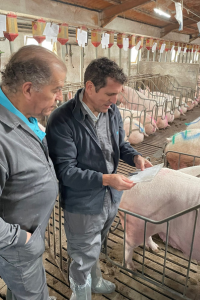To encourage end users to incorporate sorghum into their feed rations, the U.S. Grains Council partnered with a renowned commercial research institution, Animal Data Analytics (ADA), to conduct a trial showcasing the performance of sorghum in swine diets. Jace Hefner, USGC manager of global trade, travelled to Segovia, Spain to observe the trial’s commencement.
Feeding trials are one of the most effective ways to market raw materials as feedstocks, since feed millers need to see the impact on their bottom line before buying a premium product. Without a thorough understanding of the return on investment, producers remain hesitant to consider alternatives to their locally available feedstocks.
“The Council is excited to partner with ADA to facilitate this trial,” Hefner said. “This measurement of sorghum’s efficacy in swine diets will not only serve to bolster its feed grain use in the Iberian Peninsula, but in markets around the world with elevated quality standards for pork products.”
The trial consists of 288 pigs that will receive three separate diets: a traditional Spanish control diet of wheat and barley, a corn-based diet, and a sorghum-centric diet. The animals will be fed over the course of 77 days, including 28 days in the growing phase and 49 in the finishing phase. Upon the trial’s completion in February 2024, diet effects on health, performance, fat firmness, meat quality and color and environmental impact will be measured and aggregated.
Integrating sorghum into Iberian pig feeds has historically shown superior performance to competing feedstocks in global markets, particularly when compared to those native to Spain and its nearby trade partners.
“There is no doubt about the quality of U.S.-grown sorghum, and the Council’s tireless support of agricultural research and testing continues to show its value to importers and international producers,” Hefner said.
Learn more about the Council’s work in sorghum here.
About The U.S. Grains Council
The U.S. Grains Council develops export markets for U.S. barley, corn, sorghum and related products including distiller’s dried grains with solubles (DDGS) and ethanol. With full-time presence in 28 locations, the Council operates programs in more than 50 countries and the European Union. The Council believes exports are vital to global economic development and to U.S. agriculture’s profitability. Detailed information about the Council and its programs is online at www.grains.org.

